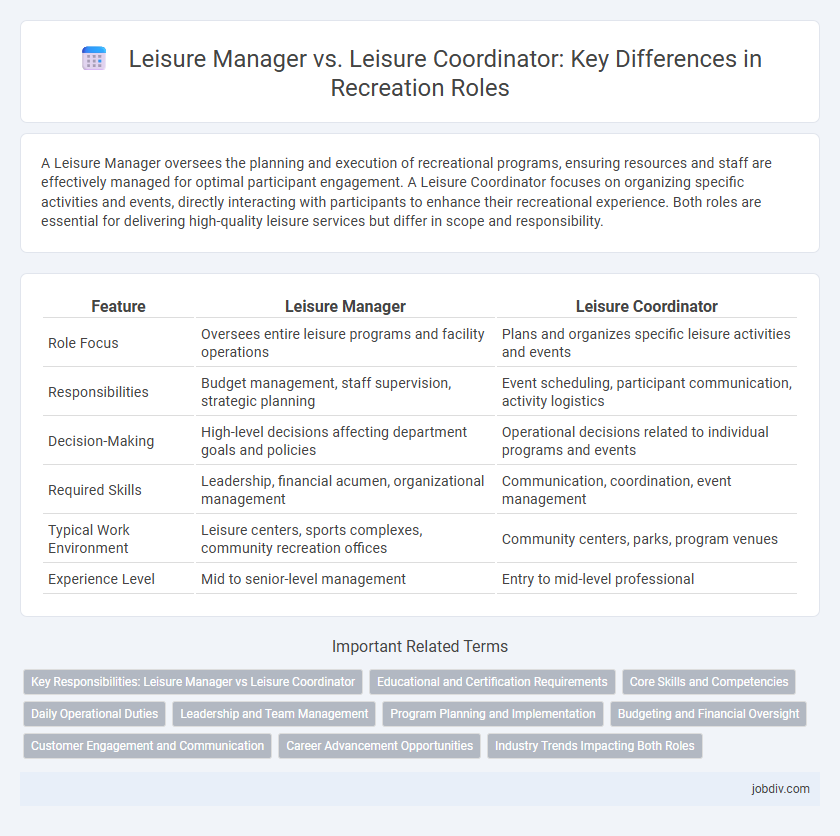A Leisure Manager oversees the planning and execution of recreational programs, ensuring resources and staff are effectively managed for optimal participant engagement. A Leisure Coordinator focuses on organizing specific activities and events, directly interacting with participants to enhance their recreational experience. Both roles are essential for delivering high-quality leisure services but differ in scope and responsibility.
Table of Comparison
| Feature | Leisure Manager | Leisure Coordinator |
|---|---|---|
| Role Focus | Oversees entire leisure programs and facility operations | Plans and organizes specific leisure activities and events |
| Responsibilities | Budget management, staff supervision, strategic planning | Event scheduling, participant communication, activity logistics |
| Decision-Making | High-level decisions affecting department goals and policies | Operational decisions related to individual programs and events |
| Required Skills | Leadership, financial acumen, organizational management | Communication, coordination, event management |
| Typical Work Environment | Leisure centers, sports complexes, community recreation offices | Community centers, parks, program venues |
| Experience Level | Mid to senior-level management | Entry to mid-level professional |
Key Responsibilities: Leisure Manager vs Leisure Coordinator
Leisure Managers oversee the strategic planning and development of recreational programs, manage budgets, and coordinate staff to ensure efficient facility operations. Leisure Coordinators focus on implementing and organizing specific activities, liaising with participants, and handling day-to-day event logistics. Both roles require strong communication skills and a deep understanding of community needs but differ in scope, with managers taking a broader leadership role and coordinators executing operational tasks.
Educational and Certification Requirements
Leisure managers typically require a bachelor's degree in recreation management, leisure studies, or a related field, often complemented by professional certifications such as Certified Park and Recreation Professional (CPRP). Leisure coordinators usually hold an associate degree or a certificate in leisure services, recreation, or event planning, with certifications like the CPRP enhancing their qualifications. Both roles benefit from ongoing education in health and safety regulations, program development, and community engagement strategies.
Core Skills and Competencies
Leisure Managers excel in strategic planning, budget management, and team leadership, ensuring efficient operation of recreational programs. Leisure Coordinators specialize in event planning, participant engagement, and logistical coordination, focusing on executing activities effectively. Both roles require strong communication skills, knowledge of community needs, and the ability to foster inclusive environments for diverse populations.
Daily Operational Duties
Leisure Managers oversee the overall daily operations of recreational facilities, including staff management, budgeting, and strategic planning to ensure seamless service delivery. Leisure Coordinators focus on organizing and implementing specific programs or activities, coordinating schedules, and engaging participants to optimize user experience. Both roles require strong communication skills, but Leisure Managers emphasize leadership and resource allocation, while Leisure Coordinators prioritize event execution and participant coordination.
Leadership and Team Management
Leisure Managers oversee strategic planning and resource allocation, demonstrating advanced leadership skills to guide diverse teams toward achieving organizational goals. Leisure Coordinators handle day-to-day team management, coordinating schedules and activities to ensure smooth operation and staff collaboration. Strong communication and motivational abilities are essential for both roles to foster effective teamwork and enhance recreational program delivery.
Program Planning and Implementation
Leisure Managers oversee strategic program planning and implementation, ensuring alignment with organizational goals and resource allocation for community recreation services. Leisure Coordinators handle day-to-day operational aspects, coordinating activities, schedules, and participant engagement to execute programs effectively. Both roles require expertise in community needs assessment, but managers focus on long-term development while coordinators emphasize practical delivery.
Budgeting and Financial Oversight
Leisure Managers oversee comprehensive budgeting processes, allocating funds to various departments and ensuring financial goals align with organizational objectives. Leisure Coordinators focus on monitoring expenses within specific programs, maintaining accurate financial records, and reporting deviations to management. Effective financial oversight in recreation relies on managerial strategic planning complemented by coordinators' detailed budget tracking.
Customer Engagement and Communication
Leisure Managers oversee strategic customer engagement initiatives, developing comprehensive communication plans to enhance client satisfaction and retention. Leisure Coordinators focus on direct interaction with customers, facilitating program participation and addressing immediate feedback to ensure positive experience outcomes. Effective communication in these roles drives community involvement and promotes recreational service success.
Career Advancement Opportunities
Leisure Managers oversee facility operations and strategic planning, positioning themselves for executive roles such as Recreation Director or Program Development Manager. Leisure Coordinators focus on organizing activities and community engagement, which can lead to advancement in event management or specialized program coordination. Career growth for Leisure Managers often involves leadership and financial oversight, while Leisure Coordinators build expertise through hands-on program execution and participant relationship development.
Industry Trends Impacting Both Roles
Leisure managers and leisure coordinators both navigate evolving industry trends such as increased digital engagement, sustainability initiatives, and personalized consumer experiences that shape program development and resource allocation. The rise of virtual reality and mobile apps demands that leisure managers integrate technology strategically while coordinators adapt on-the-ground implementation to meet user expectations. Growing emphasis on wellness and eco-friendly practices drives both roles to innovate in service delivery and community involvement within the recreation sector.
Leisure Manager vs Leisure Coordinator Infographic

 jobdiv.com
jobdiv.com